新概念英语第一册Lesson 74 What did they do?课件(共25张PPT)
文档属性
| 名称 | 新概念英语第一册Lesson 74 What did they do?课件(共25张PPT) | 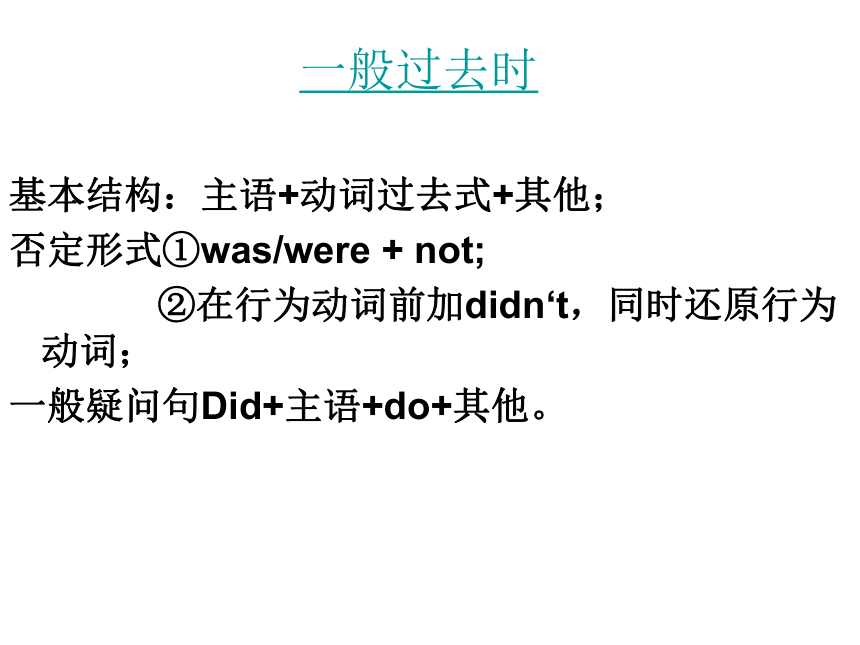 | |
| 格式 | ppt | ||
| 文件大小 | 2.6MB | ||
| 资源类型 | 教案 | ||
| 版本资源 | 新概念英语 | ||
| 科目 | 英语 | ||
| 更新时间 | 2024-01-06 08:33:44 | ||
图片预览

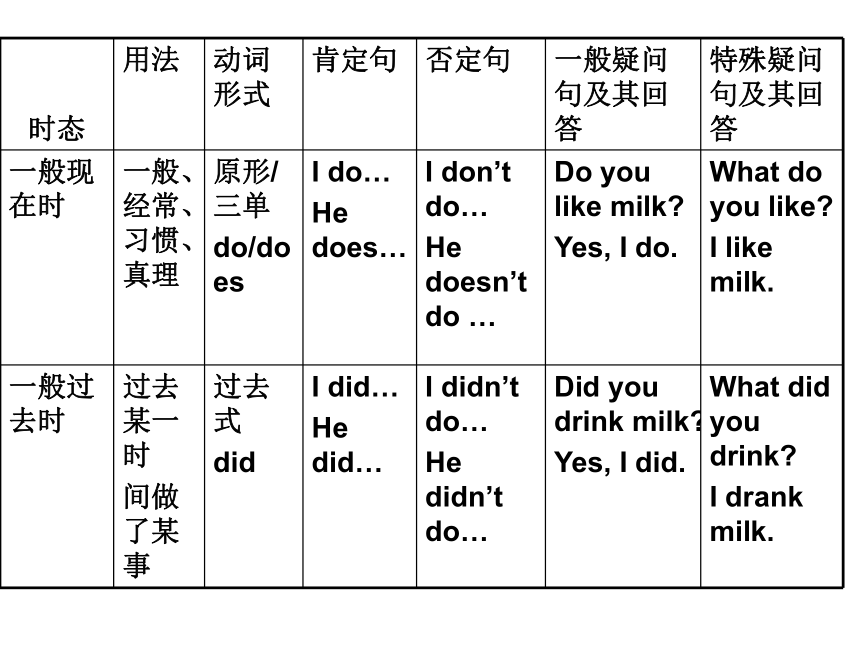
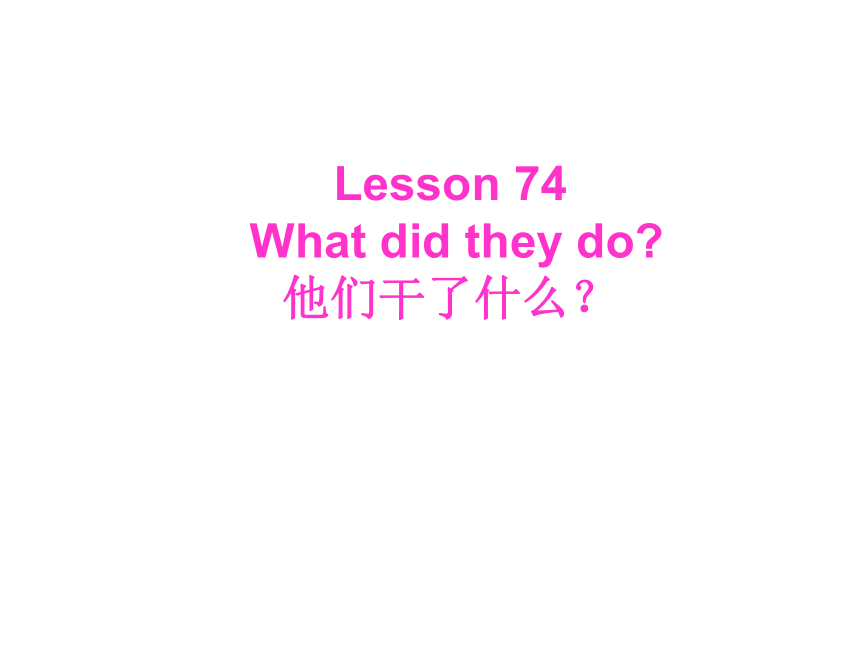
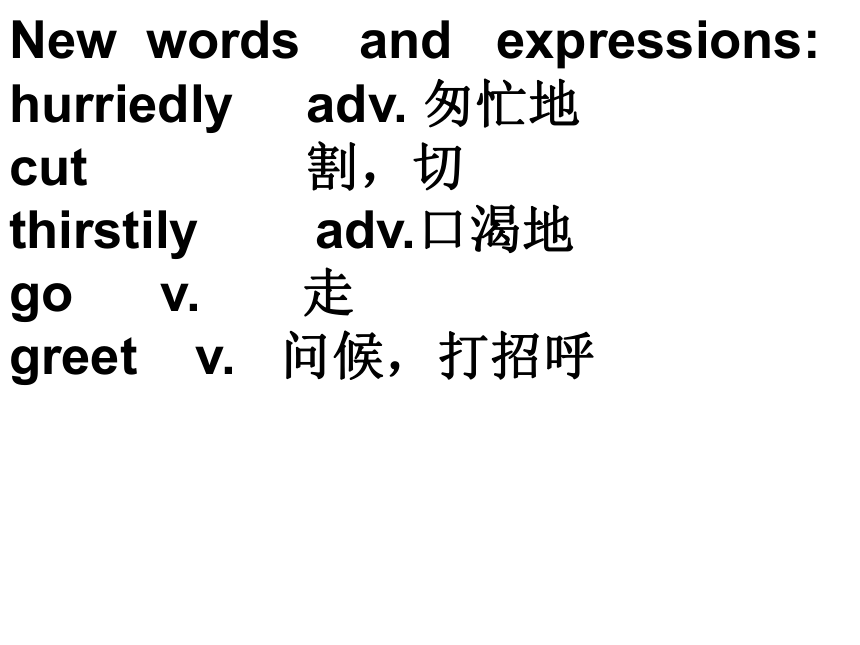
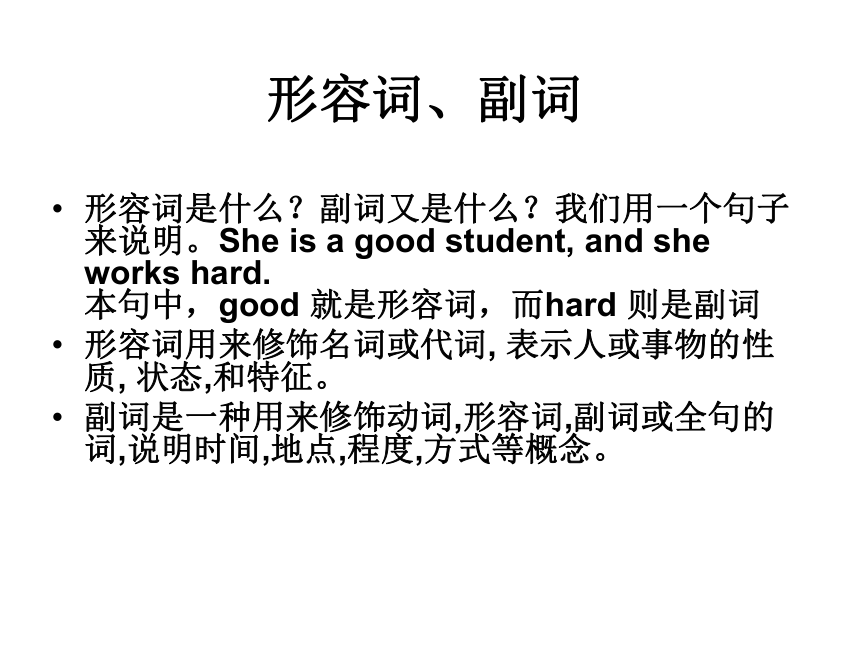
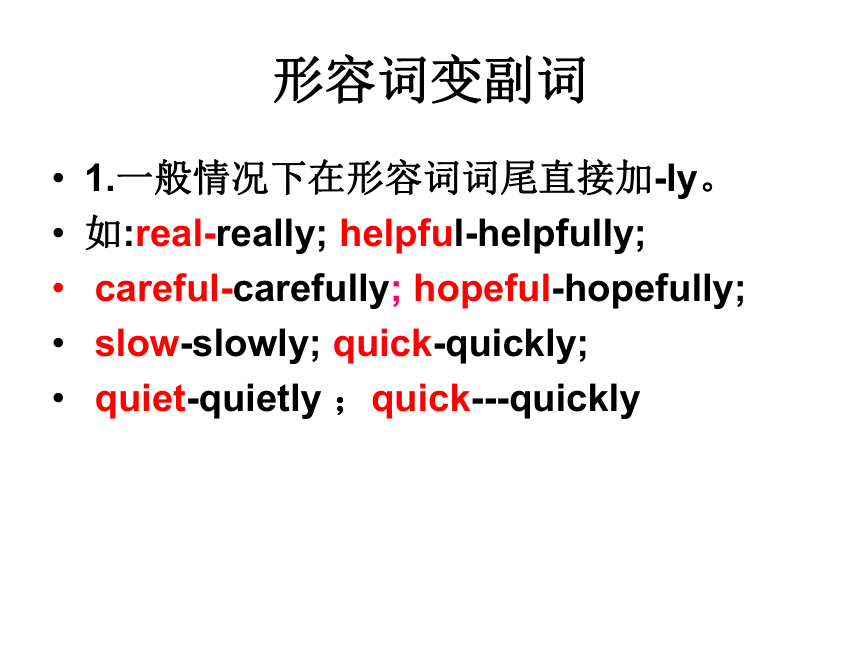
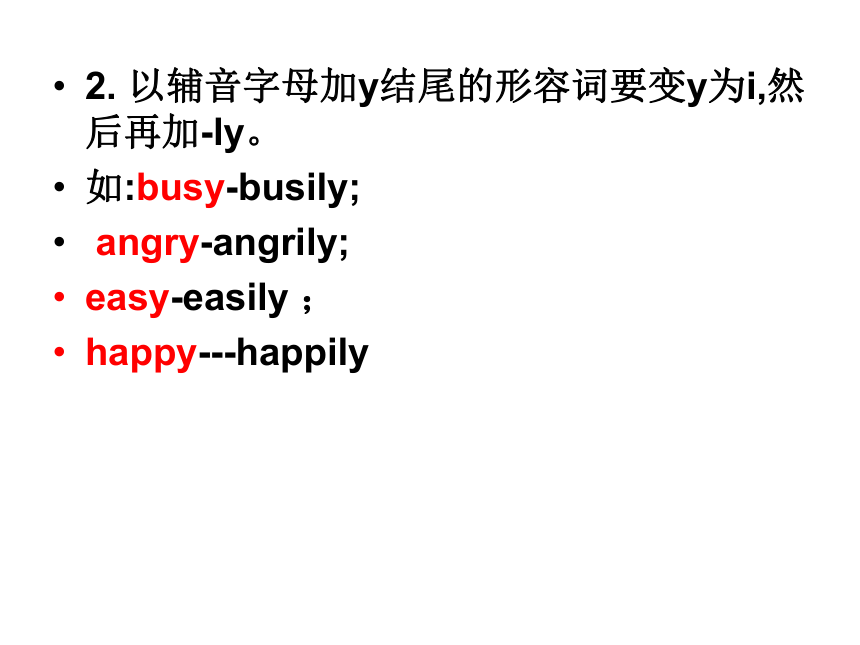
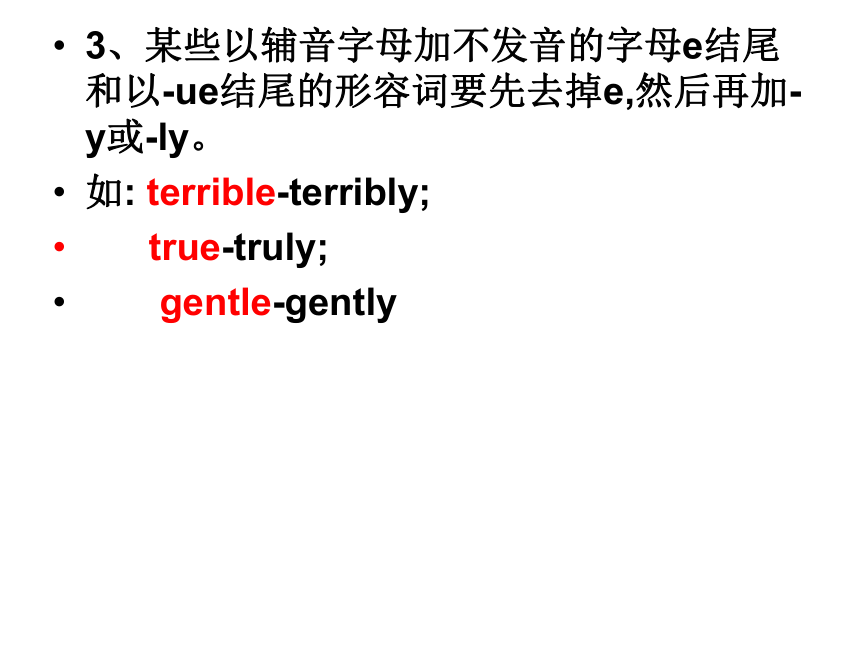
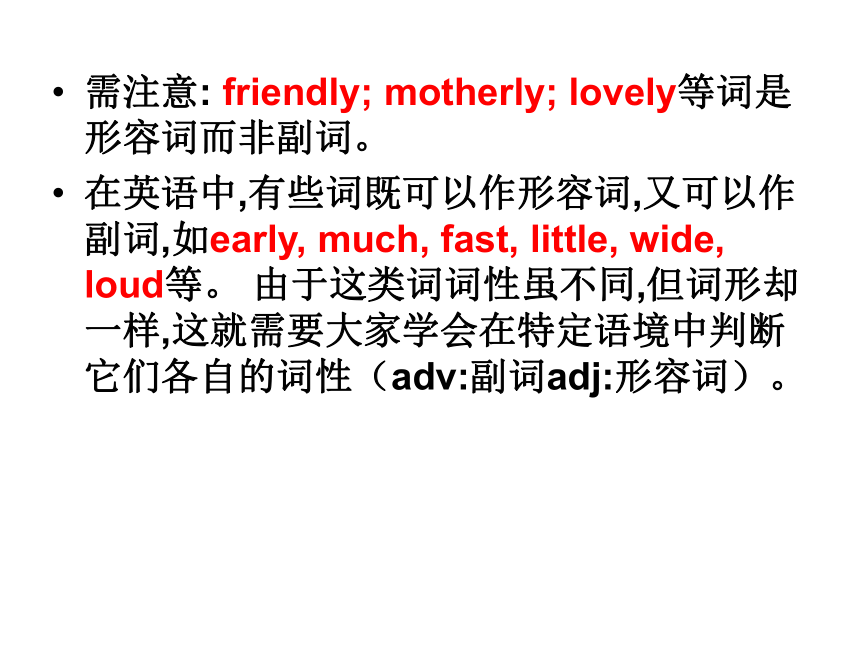
文档简介
(共31张PPT)
一般过去时
基本结构:主语+动词过去式+其他;
否定形式①was/were + not;
②在行为动词前加didn‘t,同时还原行为动词;
一般疑问句Did+主语+do+其他。
时态 用法
动词形式 肯定句 否定句 一般疑问句及其回答 特殊疑问句及其回答
一般现在时 一般、经常、习惯、真理 原形/三单
do/does I do…
He does… I don’t do…
He doesn’t do … Do you like milk
Yes, I do. What do you like
I like milk.
一般过去时
过去某一时
间做了某事 过去式
did I did…
He did… I didn’t do…
He didn’t do… Did you drink milk
Yes, I did. What did you drink
I drank milk.
Lesson 74
What did they do
他们干了什么?
New words and expressions:
hurriedly adv. 匆忙地
cut 割,切
thirstily adv.口渴地
go v. 走
greet v. 问候,打招呼
形容词、副词
形容词是什么?副词又是什么?我们用一个句子来说明。She is a good student, and she works hard. 本句中,good 就是形容词,而hard 则是副词
形容词用来修饰名词或代词, 表示人或事物的性质, 状态,和特征。
副词是一种用来修饰动词,形容词,副词或全句的词,说明时间,地点,程度,方式等概念。
形容词变副词
1.一般情况下在形容词词尾直接加-ly。
如:real-really; helpful-helpfully;
careful-carefully; hopeful-hopefully;
slow-slowly; quick-quickly;
quiet-quietly ;quick---quickly
2. 以辅音字母加y结尾的形容词要变y为i,然后再加-ly。
如:busy-busily;
angry-angrily;
easy-easily ;
happy---happily
3、某些以辅音字母加不发音的字母e结尾和以-ue结尾的形容词要先去掉e,然后再加-y或-ly。
如: terrible-terribly;
true-truly;
gentle-gently
需注意: friendly; motherly; lovely等词是形容词而非副词。
在英语中,有些词既可以作形容词,又可以作副词,如early, much, fast, little, wide, loud等。 由于这类词词性虽不同,但词形却一样,这就需要大家学会在特定语境中判断它们各自的词性(adv:副词adj:形容词)。
例句:Thank you very much. (adv.)
There is much water in the river. (adj.)
The music is too loud. Please turn it down. (adj.)
He speaks loud enough. So everyone in the room can hear what he said. (adv.)
另外,还有一类副词和形容词词义相同,但拼写却不同,如well和good。
He speaks good(adj) English. 。
He speaks English well(adv). 。
hard---hard late-late good----well
注意下面的词。
quick----quickly; thirsty----thirstily; careful----carefully
Example:
She smiled ______ . (pleasant)
She smiled pleasantly.
Complete these sentences.
模仿例句完成以下句子。
1 He read the phrase ______ . (slow)
2 He worked ______ . (lazy)
3 He cut himself ______ . (bad)
4 He worked ______ . (careful)
5 The door opened ______ . (sudden)
B Look at this table:
slowly
lazily
badly
carefully
suddenly
hurriedly adv./匆忙地
hurry v.匆忙
hurry up 快点
He shaved hurriedly this morning and cut himself badly.
shave vt. 刮胡子
hurriedly adv. 匆忙地
I gave him a glass of milk and he drank it thirstily.
thirst 口渴
thirsty adj 口渴的He is thirsty.
thirstily adv 口渴地
The bus went slowly yesterday afternoon and we arrived late.
We enjoyed ourselves very much last night.
He took a cake and ate it quickly.
I met him in the street the day before yesterday and she greeted me warmly.
They worked very hard this morning.
He swam very well this afternoon.
1. The man ____(speak) very slowly, but I didn’t understand him.
2.The tourist ____(lose) his way in Hong Kong.
3.My friend ____(meet) me at the railway station.
4.Jill’s father _____(give) her the key to the front door.
5.Mrs.Mills ____(is) in London last week.
spoke
lost
met
gave
was
6.She ____(go) to Paris last year .
7.The man _____(drink) their tea very quickly.
8.We ____(see) our friends at the bus stop.
9. The students______ (understand) me because I spoke very slowly and carefully.
10. The boy _______(find) some money and _____(take) it to his teacher.
went
drunk
saw
understood
found
took
11. We _____(swim) in the sea yesterday.
12. That man ____(do) a very good job for us.
13. The girl ____(cut) her leg very badly.
14. I _____(read) the exercise very carefully.
15. ------Did she speak to you
-------Yes , she _____(say)' Hello’.
swam
did
cut
read
said
一般过去时
基本结构:主语+动词过去式+其他;
否定形式①was/were + not;
②在行为动词前加didn‘t,同时还原行为动词;
一般疑问句Did+主语+do+其他。
时态 用法
动词形式 肯定句 否定句 一般疑问句及其回答 特殊疑问句及其回答
一般现在时 一般、经常、习惯、真理 原形/三单
do/does I do…
He does… I don’t do…
He doesn’t do … Do you like milk
Yes, I do. What do you like
I like milk.
一般过去时
过去某一时
间做了某事 过去式
did I did…
He did… I didn’t do…
He didn’t do… Did you drink milk
Yes, I did. What did you drink
I drank milk.
Lesson 74
What did they do
他们干了什么?
New words and expressions:
hurriedly adv. 匆忙地
cut 割,切
thirstily adv.口渴地
go v. 走
greet v. 问候,打招呼
形容词、副词
形容词是什么?副词又是什么?我们用一个句子来说明。She is a good student, and she works hard. 本句中,good 就是形容词,而hard 则是副词
形容词用来修饰名词或代词, 表示人或事物的性质, 状态,和特征。
副词是一种用来修饰动词,形容词,副词或全句的词,说明时间,地点,程度,方式等概念。
形容词变副词
1.一般情况下在形容词词尾直接加-ly。
如:real-really; helpful-helpfully;
careful-carefully; hopeful-hopefully;
slow-slowly; quick-quickly;
quiet-quietly ;quick---quickly
2. 以辅音字母加y结尾的形容词要变y为i,然后再加-ly。
如:busy-busily;
angry-angrily;
easy-easily ;
happy---happily
3、某些以辅音字母加不发音的字母e结尾和以-ue结尾的形容词要先去掉e,然后再加-y或-ly。
如: terrible-terribly;
true-truly;
gentle-gently
需注意: friendly; motherly; lovely等词是形容词而非副词。
在英语中,有些词既可以作形容词,又可以作副词,如early, much, fast, little, wide, loud等。 由于这类词词性虽不同,但词形却一样,这就需要大家学会在特定语境中判断它们各自的词性(adv:副词adj:形容词)。
例句:Thank you very much. (adv.)
There is much water in the river. (adj.)
The music is too loud. Please turn it down. (adj.)
He speaks loud enough. So everyone in the room can hear what he said. (adv.)
另外,还有一类副词和形容词词义相同,但拼写却不同,如well和good。
He speaks good(adj) English. 。
He speaks English well(adv). 。
hard---hard late-late good----well
注意下面的词。
quick----quickly; thirsty----thirstily; careful----carefully
Example:
She smiled ______ . (pleasant)
She smiled pleasantly.
Complete these sentences.
模仿例句完成以下句子。
1 He read the phrase ______ . (slow)
2 He worked ______ . (lazy)
3 He cut himself ______ . (bad)
4 He worked ______ . (careful)
5 The door opened ______ . (sudden)
B Look at this table:
slowly
lazily
badly
carefully
suddenly
hurriedly adv./匆忙地
hurry v.匆忙
hurry up 快点
He shaved hurriedly this morning and cut himself badly.
shave vt. 刮胡子
hurriedly adv. 匆忙地
I gave him a glass of milk and he drank it thirstily.
thirst 口渴
thirsty adj 口渴的He is thirsty.
thirstily adv 口渴地
The bus went slowly yesterday afternoon and we arrived late.
We enjoyed ourselves very much last night.
He took a cake and ate it quickly.
I met him in the street the day before yesterday and she greeted me warmly.
They worked very hard this morning.
He swam very well this afternoon.
1. The man ____(speak) very slowly, but I didn’t understand him.
2.The tourist ____(lose) his way in Hong Kong.
3.My friend ____(meet) me at the railway station.
4.Jill’s father _____(give) her the key to the front door.
5.Mrs.Mills ____(is) in London last week.
spoke
lost
met
gave
was
6.She ____(go) to Paris last year .
7.The man _____(drink) their tea very quickly.
8.We ____(see) our friends at the bus stop.
9. The students______ (understand) me because I spoke very slowly and carefully.
10. The boy _______(find) some money and _____(take) it to his teacher.
went
drunk
saw
understood
found
took
11. We _____(swim) in the sea yesterday.
12. That man ____(do) a very good job for us.
13. The girl ____(cut) her leg very badly.
14. I _____(read) the exercise very carefully.
15. ------Did she speak to you
-------Yes , she _____(say)' Hello’.
swam
did
cut
read
said
同课章节目录
